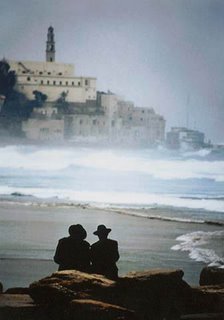 I was invited to attend Adam LeBor's launch of his eagerly-awaited new book, City Of Oranges: Arabs And Jews In Jaffa, last evening at Daunt Books in Marylebone, one of the most beautiful shops (with its arcade) in London. The photograph above, by Judy Hamer, shows Jaffa in the near distance.
I was invited to attend Adam LeBor's launch of his eagerly-awaited new book, City Of Oranges: Arabs And Jews In Jaffa, last evening at Daunt Books in Marylebone, one of the most beautiful shops (with its arcade) in London. The photograph above, by Judy Hamer, shows Jaffa in the near distance.LeBor was born in London and studied at Leeds University and also at the Hebrew University in Jerusalem. He worked for several national British newspapers before becoming a foreign correspondent in 1991. Since then he has travelled extensively in eastern and central Europe, covering the Yugoslav wars for the Independent and The Times. Currently Central Europe Correspondent for The Times he also contributes to Literary Review, the Jerusalem Report and Condé Nast Traveller. His books have been published in ten languages.
I co-wrote a screenplay with LeBor in the late 90s, Necessary Evil, which aroused a great deal of film industry interest but was ultimately shelved, due to its controversial re-telling of the Nazi gold story and the new rise of fascism on the Internet, just at the moment when 9/11 made such ideas of terror in the homeland, and revenge, more than fictionally disturbing. Spielberg's Munich now looks to explore territory we had begun to map out.
His new book, according to his agency is: "The first account of the Arab-Israeli conflict to be told through the personal stories of families who live there, that faces up to the grim realities of bombings and checkpoints but keeps the human side firmly in view. Through the stories of six families – three Jewish and three Arab – Adam LeBor goes behind the news and the rhetoric of entrenched positions to tell the tragic, occasionally comic, but always deeply human story of Israel in the last eighty years.In the words of people who lived through those times, or are retelling the stories of their parents and grandparents, we understand that the founding of the state of Israel could be simultaneously a moment of jubilation for the Jews, and a moment of disaster – the naqba – for the 100,000 Arabs who fled Jaffa in 1948, most of them never to return. And we see the main port of the Eastern Mediterranean sprout a modern European suburb of Tel Aviv, with white Bauhaus architecture, of which Jaffa today has become a suburb. But, though full of tension and violence, this is not a story without hope."
The book has now been reviewed in The Guardian Saturday Review and selected as "Book of the Week":
http://books.guardian.co.uk/review/story/0,,1690070,00.html
Comments